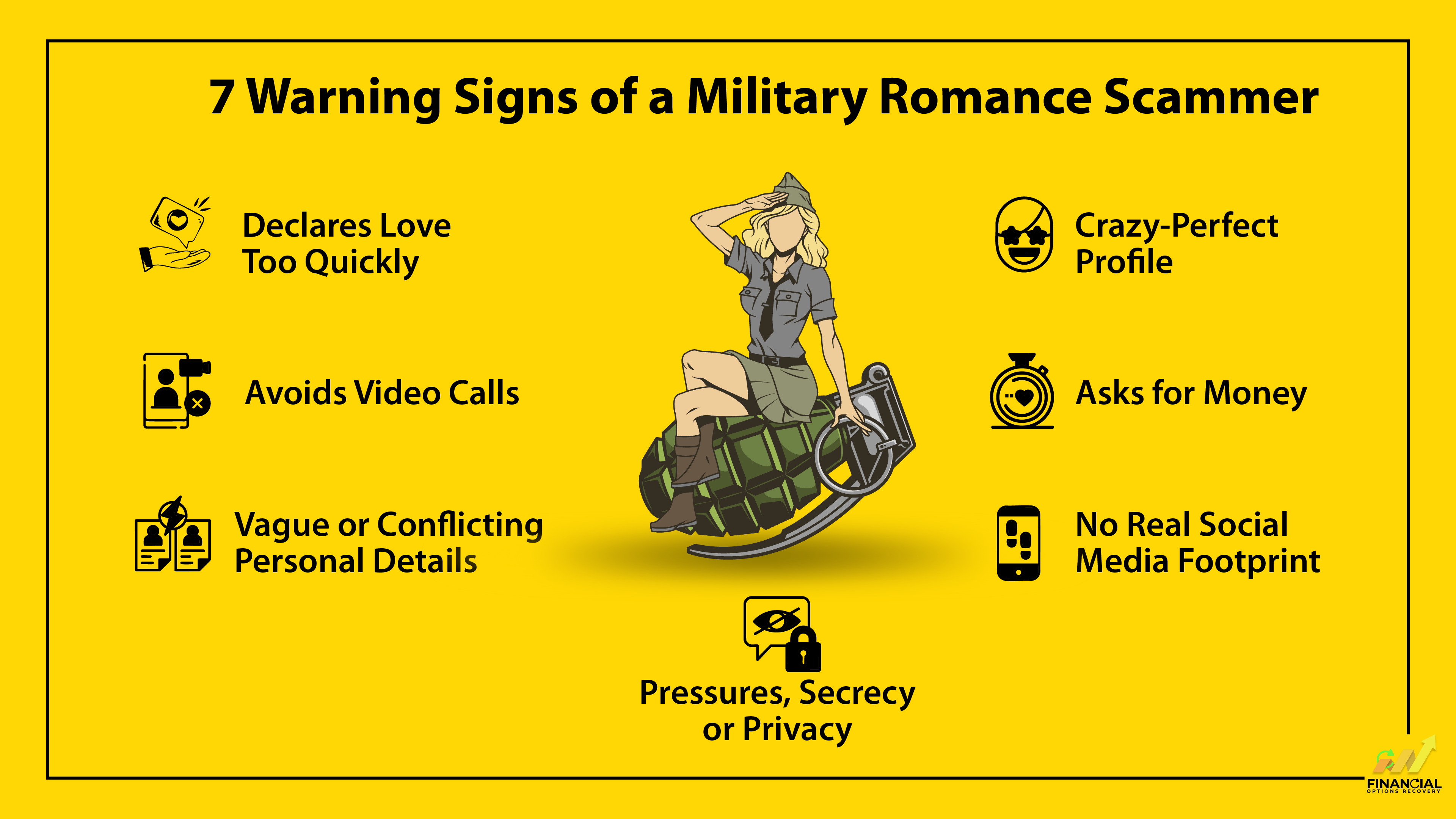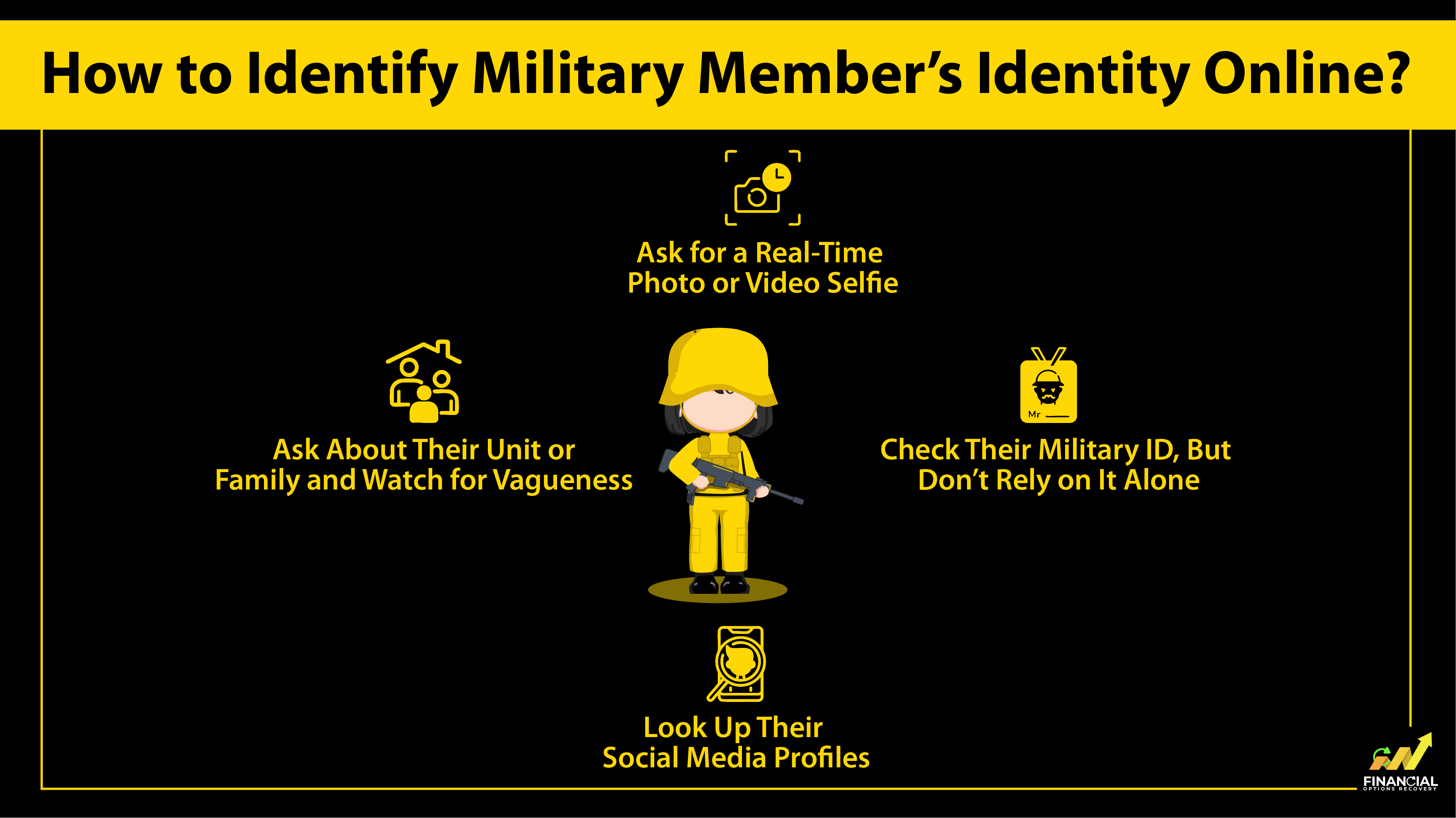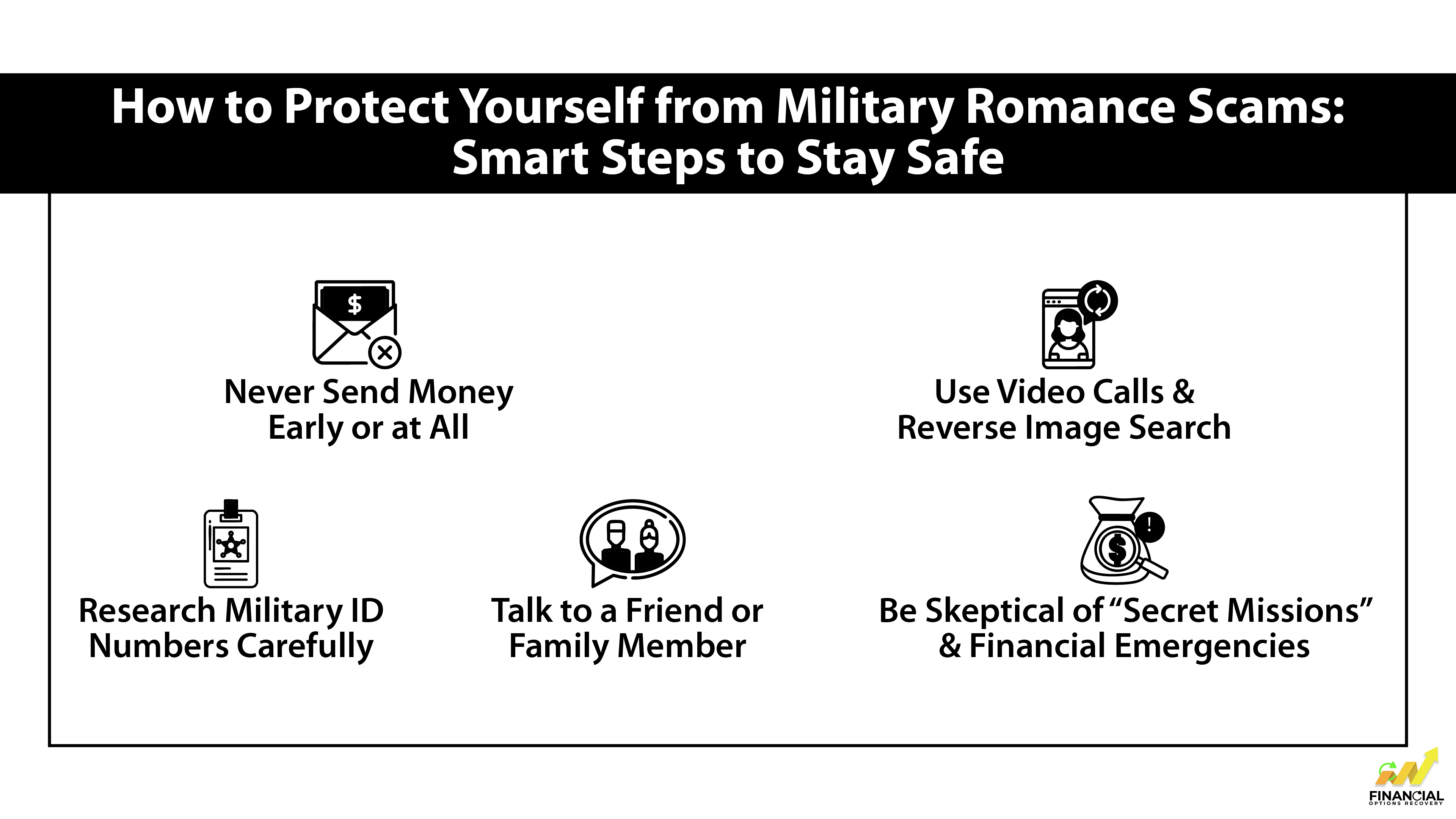
Military romance scams often begin innocently enough with a friendly message. It is respectful, courteous, and apparently genuine. The sender identifies himself as a soldier stationed abroad, perhaps having stumbled upon your page by accident. Portraying himself as an honorable, lonely individual and just wanting to have someone to chat with
As the communication goes along, the sender will present convincing stories of valor, suffering, and a desire for an ordinary life. Trust is developed, and eventually, the perception of a true emotional connection develops. You feel understood, valued, and even loved.
Then, suddenly, the tone shifts.
A trivial request that can even appear harmless initially. What starts as a genuine relationship becomes manipulation and emotional exploitation.
Military dating scams are not only financially debilitating; they use up your time, break your trust, and provide long-term emotional anguish. Military romance scams are carefully designed with actual military images, hijacked identities, and emotional storytelling to win your sympathy and trust.
Let’s arm you with the knowledge to protect your heart and your finances.
Table of Contents
Military romance scam is a very heartless type of online love scam that takes advantage of innocent people. The scammers create fake names and pose as present-day members of the military to win your trust. They intend to use your emotions as well as your money for their own gain. The scammers are adept at playing with emotions, providing tales of courage, struggles, and sacrifice, all meant to establish trust, only to then dash it later.
These criminals often target:
Here’s the thing about military romance scams: they don’t just launch straight into a demand for money. They always start with an overwhelming amount of kindness.
Military romance scams follow a calculated script to trap their victims. Scammers are incredibly patient. They genuinely know how to patiently build trust and then expertly toy with your emotions. Here's how they typically operate:
1. Stolen Identities and Phony Profiles:
Military romance fraudsters start off by pirating photos of actual members of the military, usually from social media, and then construct very credible-looking fake profiles on dating sites or social media platforms. They'll adopt heroic-sounding names and construct profiles that are just about too good to be true, all to immediately win your confidence and convince you that they're for real.
2. Love Bombing and Instant Connection:
In a matter of days, or even a matter of hours, they will profess deep love and affection for you. This overwhelming compliment, or "love bombing," is an extremely effective strategy. It makes you feel wanted and special, and it's programmed to push the relationship ahead, skipping your healthy skepticism and rational judgment.
3. Heartbreaking Stories and Emotional Manipulation
Soon enough, they will begin to tell heartbreaking and emotional lies. They may say they are a single parent raising a child on their own, or have been wounded in war. These stories are all carefully scripted to make you sympathetic and feel in deep connection with their plight.
4. Secret Missions and Financial Isolation:
A common excuse is that they're on a secret or classified mission in a remote area, supposedly without access to their bank accounts or any way to manage their money. This crucial step explains why they can't handle their own finances and why you will need to step in.
5. Demands for Money:
The requests for money typically start small, perhaps a phone card, a gift card, or a small amount for internet access. Once you've sent money, the demands quickly grow larger and more frequent. And if you even think about hesitating? They’ll push you on the guilt trip, saying they “thought you cared.” Or that “ you’ve let them down.”
So, how do you know when something just isn’t right? These scammers follow patterns, and once you know what to look for, the warning bells get a lot easier to hear.

Here are the top 7 Red Flags that should make you stop and think before getting any deeper:
If you are in some kind of conversation with a supposed military person, and something just feels a little weird about it, or you want to be extra cautious, there are some clear and direct steps for checking out the identity. It is not to be suspicious of anybody without a cause; it is just being smart enough for self-protection.

Here’s a little checklist you can actually use to protect yourself and your peace of mind.
Always remember that you are not being rude; you are merely playing it safe and being wise. Someone who genuinely cares about you will respect your caution and value your safety. If their reaction is adverse, manipulative, or intended to make you feel guilty, well, that kind of reaction will reveal far more to you than any fabricated ID ever will.
When you're connecting with someone online who says they're in the military, it's wise to have a few smart habits in your back pocket. The truth is, these simple steps can make all the difference between building a real, healthy connection and falling into a scammer's trap.

Here's how to shield yourself and your heart before things go too far:
Want more tips on staying one step ahead of scammers? Check out our full guide on preventive measures against romance scams for even more practical advice.
If you were scammed, remember this: you are not alone. These thieves are calculating, manipulative, and coached to take advantage of your good nature. It is natural to feel hurt or embarrassed, but shame should not inhibit you from taking action. Here’s exactly what you should do, step by step:
Step 1:
Cut off contact right away. Block them on all platforms, wherever they have reached you. Then report their account to the platform (Facebook, Instagram, WhatsApp, etc.) so others won’t fall into the same trap
Step 2:
File an official complaint with
Step 3:
Contact your bank or card provider; you may be able to request a chargeback or reverse the transaction if caught early.
Step 4:
It’s smart to talk to professionals who deal with this exact kind of scam. You can explore our recovery options with experts who understand the process at Financial Options Recovery. They specialize in online romance scam recovery and can guide you on the best next steps.
Scammers thrive in silence, but taking action, even if it’s just the first small step, helps you take back control. You deserve support, and you don’t have to go through it alone.
You’ve been through enough already; now it’s time to take back control.
When you're ready to take action, Financial Options Recovery is here to support you, not just as recovery professionals, but as people who care. Start with a free, no-pressure evaluation. We’ll listen, guide you, and help you understand your recovery options.
It’s when someone pretends to be a soldier to build an online relationship and gain your trust then eventually asks for money using emotional or urgent stories.
Yes, in many cases, recovery is possible especially if you act quickly and seek professional help with tracking transactions and communicating with financial institutions.
Ask for a real-time video call and never rely on just photos or messages. Be cautious of anyone who avoids video or gives vague answers about their unit or deployment.
Yes, many scammers now request payments in crypto because it’s harder to trace and reverse if they ask for crypto; that’s a major red flag.
Block the scammer, report the fraud to authorities, and contact your bank or payment provider. Then reach out to a recovery service for further support.